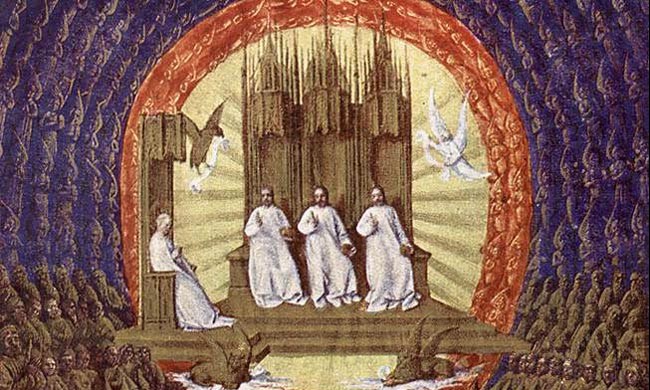The Church places the ancient Latin hymn, the Te Deum, at the end of the year as a way of giving solemn thanks to God. The Manual of Indulgences grants an indulgence to the faithful who pray it in a church on the final day of the year as a way of thanking God for all the benefits He has bestowed on them throughout the year (#26, §1, 2°). Yet, this traditional hymn of thanksgiving does not have any explicit mention of giving thanks.
A Catholic who is unfamiliar with the content of the hymn might recognize instead the great 19th-century hymn Holy God, we praise Thy name, which is a paraphrase of the Te Deum. In order to get the sense of the place of the Te Deum in the liturgy, it would be useful to compare it to the Gloria in the Mass. Both are very ancient Latin hymns which praise God for the greatness of His divinity and move on to the praise of His saving works in Jesus Christ. Both are prescribed to be sung on days of an especially festive nature. On Sundays, solemnities, and feast days, the Gloria is sung at Mass, while the Te Deum is sung at the Liturgy of the Hours. We also sing the Te Deum outside the liturgy. The friars often sign it as a song of thanksgiving at a particularly joyous event, like the election of a pope or superior.
So why isn’t there a mention of thanksgiving in the hymn?
When we speak of gratitude, we are usually referring to a specific form of justice. Justice is the virtue that makes us give others what we owe them. Gratitude is what we owe those who are our benefactors, in return for benefits received. By explicitly acknowledging what is good in our lives, we are at the same time constrained to acknowledge these goods as benefits from God. “Every good endowment and every perfect gift is from above,” St. James says, “coming down from the Father of lights” (James 1:17). The Church’s pedagogy in gratitude is meant to train us to go more and more quickly from acknowledging the gift to thanking the giver.
God’s greatness, His glory, His very divinity, however, are not really “benefits” given to us, so it is difficult to see how they would form the basis for thanksgiving. Yet, adoration of God, confession of His glory, and thanks for it seem to merge into one in the Gloria: we give you thanks for your great glory! In harmony with this line from the Gloria, the triumphant joy in confession of the truth of God’s greatness, which the Te Deum displays, might be called instead a sort of proto-thanksgiving. For God’s divinity is the basis of the liberality and mercy of God which lavishes His gifts on us, undeserving as we may be.
As our year ends, the Church encourages us to reflect on the blessings He has bestowed on us over the past year, and to pray and praise Him for it. Beneath the many gifts, the Church is always solicitous that we not forget the Giver, and so encourages us to break forth in praise of Him—thanksgiving for Him being God. “O God, we praise Thee: we acknowledge Thee to be Lord!”
✠
Image: Jean Fouquet, Enthronement of the Virgin or, The Trinity in its Glory







